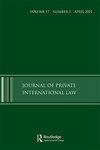No turning back: information and communication technologies in international cooperation between authorities
IF 0.5
Q3 LAW
引用次数: 0
Abstract
The usefulness of ICTs is on full display when it comes to international cooperation between authorities in civil and commercial litigation. The core international conventions on cross-border cooperation (currently in force) were drafted many decades ago, when the overwhelming growth of ICTs was unimaginable. Setting the focus on Latin America, where legal regional integration has not yet reached the level attained by the European Union, this article assesses whether the selected legal sources reject, tacitly accept, or encourage the use of ICTs in international cooperation. The analysis of international conventions, some soft law instruments and domestic PIL rules supports the argument that an adequate legal framework that accepts the use of ICTs in international cooperation is necessary. Indeed, there is no turning back from the use of technologies in this field, where modern and suitable regulation would strengthen legal certainty, of utmost importance for the parties involved in cross-border litigation.没有回头路:信息和通信技术当局之间的国际合作
在民事和商事诉讼当局之间的国际合作中,信息通信技术的有用性得到充分展示。关于跨境合作的核心国际公约(目前有效)是在几十年前起草的,当时信息通信技术的迅猛发展是不可想象的。本文将重点放在法律区域一体化尚未达到欧盟水平的拉丁美洲,评估选定的法律来源是否拒绝、默认或鼓励在国际合作中使用信息通信技术。对国际公约、一些软法律文书和国内公益诉讼规则的分析支持这样一种观点,即有必要建立一个适当的法律框架,接受在国际合作中使用信息通信技术。事实上,在这一领域使用技术是没有退路的,在这一领域,现代和适当的管制将加强法律确定性,这对涉及跨国界诉讼的各方至关重要。
本文章由计算机程序翻译,如有差异,请以英文原文为准。
求助全文
约1分钟内获得全文
求助全文

 求助内容:
求助内容: 应助结果提醒方式:
应助结果提醒方式:


